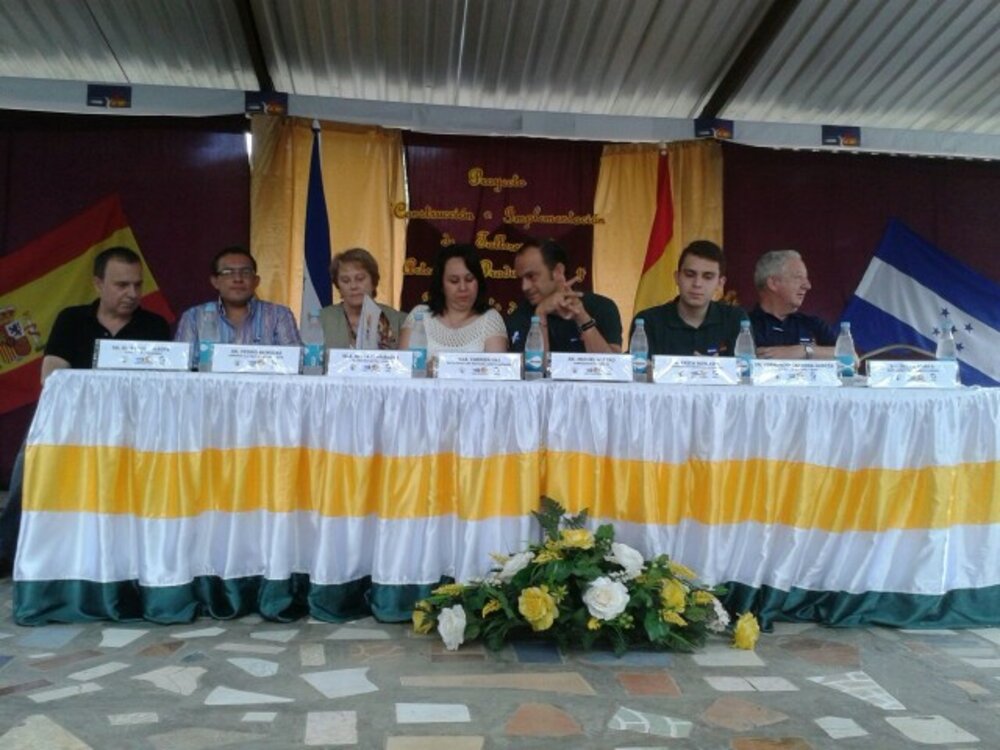CABEI Promotes Improved Coffee and Handicraft Production in Rural Areas of Honduras

An investment of L.36 million in funds from Spain’s Debt Conversion Program for Honduras, which is administered by CABEI, will be used to support the educational sector in extremely poor Honduran communities.
San Nicolás, Honduras, August 8, 2014. - In the framework of Spain’s Debt Conversion Program for Honduras, which is administered by the Central American Bank for Economic Integration (CABEI), the first stone was laid for the project, “Construction and Implementation of Workshops on Handicraft Production and Coffee Handling in San Nicolás, Santa Bárbara” at the Instituto Rafael Pineda Ponce, which is located there.
The project will receive a contribution of 35 million lempiras, and the counterpart contribution by the San Nicolás Town Hall will total 1 million lempiras. The Town Hall will be responsible for the Project’s technical management and will ensure its sustainability; it will take care of preparing the lands where the classrooms will be constructed, as well as supporting the project management from its beginning.
The financing will be used to construct classrooms for the workshops, which will focus on productive activities and handicraft making at five educational centers; the acquisition and installation of the equipment, machinery and furniture for the Project centers; the informal technical education of the young people, producers, parents and the teachers at the educational centers who wish to receive training, in addition to institutional training and strengthening.
On this occasion the first stone was laid at the Instituto Polivalente “Rafael Pineda Ponce,” but future beneficiaries include the following educational centers: Escuela Petrona Rodríguez de Bográn, Instituto Juan Lindo, Instituto Angélica Castro and Centro Experimental Linderos.
The project will directly benefit approximately 2,300 students at educational centers in the municipality of San Nicolás and will indirectly benefit 10,900.00 inhabitants in the municipality through the jobs that are generated and the training they will receive. Other beneficiaries of the initiative include the handicraft industry, family coffee farms, coffee and handicraft-related tourism business and other inhabitants of the municipality.
The program’s actions fall in the framework of the Social Development axis of CABEI’s 2010-2014 Institutional Strategy “Competitiveness with Integration and Development,” specifically to the sub-component “Contributing to the Development of Human Capital,” in addition to the Honduran National Plan, the Millennium Development Objectives and the Honduran government’s Poverty Reduction Plan.
Participants at the ceremony included Spanish Ambassador to Honduras, Mr. Miguel Albero Suárez; a representative from the Finance Ministry, Mr. Erick Robledo; a representative from the Spanish Agency for International Development Cooperation, Mrs. Bella Fernández; the CABEI Director for Spain, Mr. Fernando Cardesa; CABEI, representative Mr. Pedro Banegas; the Mayor of San Nicolás, Santa Bárbara, Mrs. Carmen Paz; Mr. Oscar Enrique Amaya, representing the beneficiaries; and Mr. José Luis Galeote, representing the Consorcio Eductrade-Assignia construction company.



